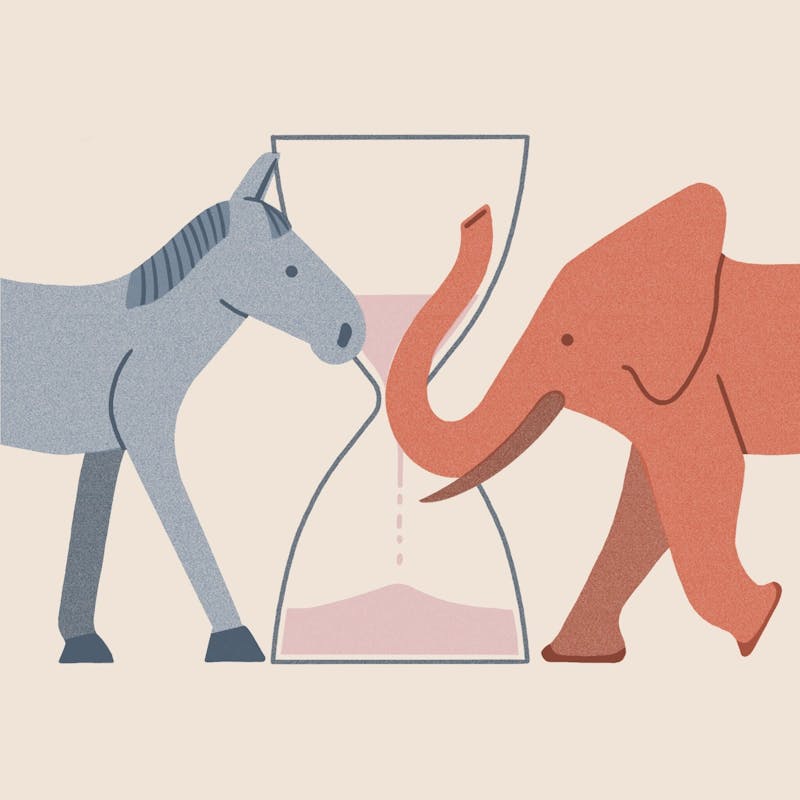As University of Wisconsin-Madison students gear up to head to the polls, representatives from campus political organizations explain their parties' choices this election cycle.


The Daily Cardinal spoke with both the College Republican and College Democrat student groups at the University of Wisconsin-Madison. Both organizations reflected on how their ideologies have changed, but both remained steadfast supporters of their candidates.
In 2020, Wisconsin voted for President Joe Biden by a margin of just around 20,600 votes. In 2024, UW-Madison reported a new record for enrollment: 52,176. Given the state’s “toss-up” status, it's no surprise that campus is a major focus for this election.
As Americans increasingly find themselves with negative opinions about our nation’s political system, it begs the question: how did we get here?
“We look back in history, starting with [President Franklin Roosevelt], where Democrats and our goals are focused on using the government as an arm to reach out and help American’s with the issues they face,” said College Democrats Volunteer Coordinator Ty Schanhofer. “And I think that’s exactly what Kamala Harris and Tim Walz are going to do.”
Harris’ campaign platform has honed in on protecting abortion rights, cutting middle-class taxes and bringing down the cost of health care.
“This election is the difference between upholding traditional values of democracy and continuing free and fair elections in this country [or] not,” said College Democrats Vice Chair Sadie Rosenthal. “It doesn’t get any closer than it does in Wisconsin [for the] presidential election.”
While the College Democrats stood strongly behind the Harris-Walz ticket, the College Republicans believe their party needs a revamp in the future.
“[There’s] not much [at stake in this election],” College Republicans Co-Vice Chair Benjamin Rothove said. While Rothove does support Trump for the presidency, he notably expressed the former president has now surrounded himself with “crazier” people.
“I think that we need a fix in the future,” he said. “We need a better Republican Party. We need a better Democratic Party. We need change.”
Trump’s campaign has increasingly focused on limiting abortion access, cracking down on immigration and highlighting a focus on the economy that has been characterized by high inflation–despite it generally decreasing.
“The Republican Party has changed in recent years, in some ways for the better, and in some ways, for the worse,” explained Rothove. “Whatever disagreements I may have with Donald Trump on trade or foreign policy, he is still the best candidate in the general election.”
Parties are furthest away from each other in last 50 years, research says
Congressional roll-call ideology reports show an interesting pattern. While both parties have moved towards their respective political spectrums, the GOP has done so at a faster rate. Today, both parties are the furthest away ideologically they have been in the last 50 years.
Harris has been characterized by conservatives as a left-leaning politician following a now-removed ranking that put Harris as the most liberal U.S. senator in 2019. Now, as the head of the Democratic ticket, she is shifting policy strategies.
Trump has used her former positions, both as senator and California’s attorney general, to argue that Harris is “radical.” To counter, Harris’ campaign has focused on portraying the candidate as more moderate by reversing her support for a ban on fracking and support for single-payer healthcare, among others.
Trump has been criticized for his extremist rhetoric and his ties to the Heritage Foundation’s Project 2025, which details a potential guide for the next Republican presidency that calls for the elimination of the Department of Education, argues for mass deportations and calls for restrictions on abortion access. Trump has repeatedly denied connections to the project.
While the College Democrats firmly stood behind their party despite the apparent shift, Rothove seemed a bit more hesitant regarding the GOP’s shift to backing Trump. He argued that should Trump lose, the Republicans must reevaluate their approach.
Earlier in the campaign, Democrats had trouble keeping their base excited with Biden’s candidacy. But when Harris took over the reins, enthusiasm grew quickly, Rosenthal said.
“Since Vice President Harris announced her candidacy in July, we’ve seen so many Democrats, whether they’re more left or more moderate quickly backing Kamala Harris and wholeheartedly supporting her, whereas in the terms of the Republican party’s shift, we’ve seen a lot less unity,” Rosenthal said.
This comes as noticeable Republicans have made the shift to endorse Harris, even those in Trump’s former administration. And in Wisconsin, a “Republicans for Harris” press call earlier in October argued Trump no longer represents the Wisconsin GOP.
Former Brown County Republican Party Chair Mark Becker asked voters to “reject his extremism,” and Cheney, an outspoken critic of Trump and member of the Jan. 6 panel, held a rally with Harris in Ripon, Wisconsin–the birthplace of the GOP.
When asked if the parties had made good decisions in their candidates this election, “[The] future of our party is moving in the right direction,” said Rosenthal.
Rothove said, “We will see in November.”